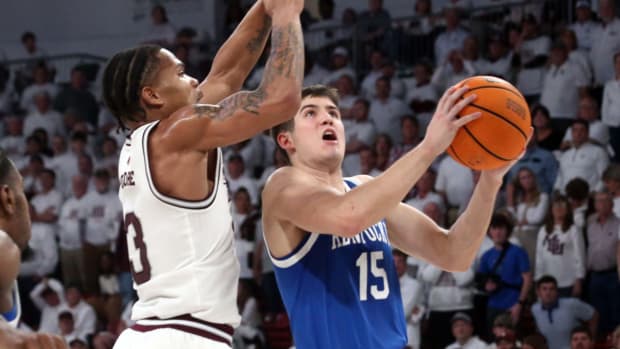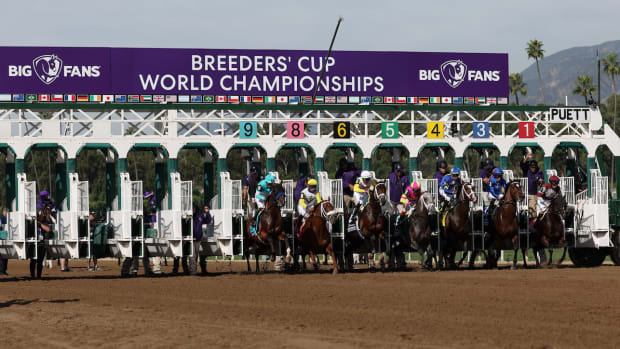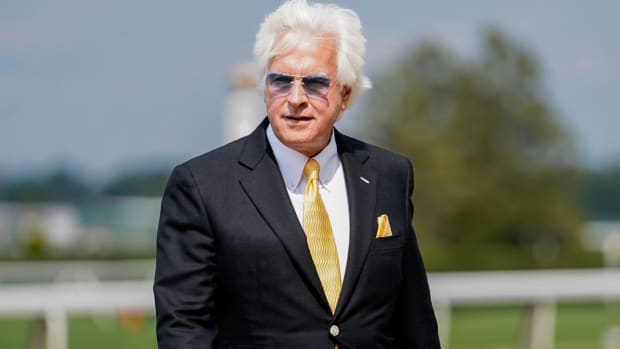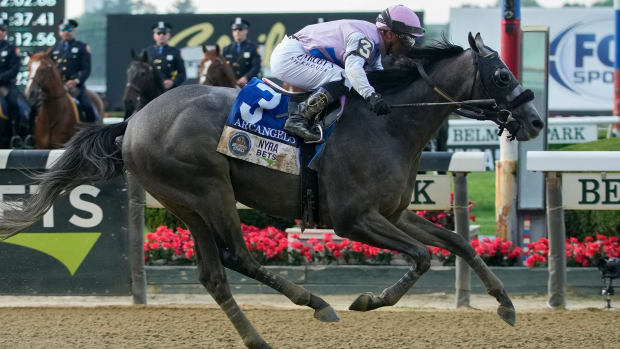Justify Attempts to Earn Triple Crown at Belmont With Less Narrative, Faded Anticipation
ELMONT, New York – Let’s get this out of the way: Yes, it’s different at Belmont Park this week. A three-year-old chestnut colt named Justify can win thoroughbred racing’s 13th Triple Crown with a victory in Saturday’s 150th running of the Belmont Stakes, and there is nothing in the sport that can match the emotional energy of a Belmont with history in the balance. It is the pinnacle of the game. Thirty-five times since 1918, a three-year-old has arrived in New York with a chance to join one of the most exclusive clubs in any sport (It’s true the Triple Crown wasn’t named until after Sir Barton won the first in 1919, but he’s long been considered the initial winner) and the place crackles with anticipation every time. But this time, something is missing.
The desperation.
After Affirmed’s Triple Crown in 1978, the third of the decade after Secretariat and Seattle Slew, racing settled into a cocky expectation that more triples would follow (swiftly forgetting the 25 years that passed between Citation in 1948 and Secretariat in 1973). Spectacular Bid looked like a certain Triple Crown winner in 1979, but fell short in the Belmont either because he stepped on a safety pin in his stall or because his jockey gave him a bad ride. (Go ahead and discuss.) Two years later Summing got through on the rail to beat Pleasant Colony, who was chasing the triple. Six more years passed before Alysheba was crushed by Bet Twice in the Belmont and then two more before Easy Goer finally beat Sunday Silence. A new narrative developed and then got traction in the late 90s when Bob Baffert’s Silver Charm and Real Quiet were denied, back-to-back in ’97 and ’99, then when D. Wayne Lukas’s Charismatic was beaten (and broke down) in 1999.
More than two decades had passed since Affirmed, who grew smaller in the distance. There were three more near-misses in the early 2000s: War Emblem, Funny Cide and, heartbreakingly, in the last 100 yards on the long Belmont homestretch, the popular Smarty Jones in 2004. The story changed: It was no longer about some horse winning the Triple Crown, it was about the drought. Resoundingly, as Big Brown was weirdly eased in 2008 (discuss that one, too, if you like; others have) and I’ll Have Another didn’t make the race in 2012 and California Chrome, beloved by racing fans for his humble beginnings, was beaten by a Derby-and-Preakness-skipping Tonalist in 2014, the story became the gap between Triple Crowns.
And that story evolved into endless ruminations on whether breeding had produced a more fragile thoroughbred that simply could not win three tough races in five weeks, especially with the last covering 1 ½ miles and often with rested horses like Tonalist lying in wait. (“The coward’s way out,’’ bellowed poor, sodden Chrome minority owner Steve Coburn on that memorable afternoon, and plenty of interlopers agreed with him.) And further ruminations on whether perhaps the series should be altered to make it more achievable. No less than Lukas himself advocated for shorter races with long gaps between them, which surely would have produced more Triple Crown winners, all with giant asterisks. Maybe that would be OK? Other sports change. The arguments unfolded in lockstep with the frequent near misses. Trainers, owners and jockeys took pride in spoiling bids (which they should, but more than once they did so while making no attempt to win on their own).
The drought became bigger than its component parts, the narrative that ate racing. It was at first an elephant in the room, and then it was a room full of elephants.
You know where this is going: In the first week of June in 2015, American Pharoah won the Belmont Stakes to become racing’s 12th Triple Crown winner, and to end the 37-year wait that started after Affirmed. It was a remarkable moment: Belmont Park quivered as Pharoah rolled through the line. There was a roar that lasted minutes past the finish line and it was more than just appreciation for an athlete and for his accomplishment, it was three generations of racing fans casting demons into the twilight. The wait was over at last. "I was so happy for the sport," said Baffert, Pharoah’s (and Justify’s) trainer, last week. “I couldn’t believe how loud it was. He has said this before but still can’t shake it.”
This is what I wrote that night.
And some more, three days later.
Three years have gone by, and something has become apparent. There was an unintended consequence to American Pharoah’s victory: While it ended a drought that lay across racing’s shoulders like a steel girder, it also erased the storyline that, while often framed in negative terms, had brought a heightened interest to Triple Crown Belmonts. Is this finally the one? Suddenly, a year later, racing was finally in possession of a Triple Crown champion, but had lost its foundation narrative. As Baffert says, “It’s different, because we already did it.’’ No matter in the immediate moment: Nyquist won the 2016 Derby but was beaten by Exaggerator in the mud at Pimlico and Always Dreaming won the 2017 Derby but was trounced in the Preakness.
This gave racing a reprieve. Each year in which the Triple Crown remained unclaimed, a little more life was pumped into the legend of American Pharoah. And truth is that racing could have used another four or five years before another horse arrived in New York with a shot at the Triple Crown. A mini-drought, just in service of the story. But it’s been only three years and now here is Justify. It is the first Triple Crown attempt in many years without the drought as a marketing tool and validating principle. So while Belmont Park should be full—or nearly full on Saturday—and while television ratings on NBC should be strong, there is a very different atmosphere than during the drought.
But: Full stop. Let’s not confuse the moment with the accomplishment. “The fact that American Pharoah won the Triple Crown has probably made people realize that it can be done,’’ says trainer Bill Mott, who will send a (rested) Hofburg out to test Justify on Saturday. “After 37 years, people were wondering if it would ever happen again. Then it did. But that shouldn’t diminish the feat. It’s still very difficult.’’
The obvious parallel here is the 1970s. After Secretariat broke through, in transcendent form, Seattle Slew came along four years later and become the first unbeaten Triple Crown winner. (Justify can become the second.) And then Affirmed prevailed in a three-race rivalry with Alydar. Both Slew and Affirmed— Alydar, too—were popular racehorses. There was plenty of buzz. But the parallel has limits; racing was more popular in the 1970s and the sports media landscape far less cacophonous. It’s just not entirely the same.
The most compelling parallel in modern U.S. sports would be the post-millenial Boston Red Sox. Their World Series victory in 2004 ended 86 years of waiting. They would win two more in the next seven years, and while those were sensational for Boston fans, there was nothing quite like the first one, because you cannot re-create a painful, 86-year wait. In racing, you cannot re-create a 37-year wait and the emotions that accompanied its death.
However: Justify is attempting to do something remarkable on Saturday. Not only would he be the first perfect Triple Crown winner since Slew, he would be accomplishing a punishing feat despite starting his career much later than any Triple Crown. It’s already been widely noted that Justify won the Kentucky Derby without having raced as a two-year-old, ending the so-called Apollo curse (because the last Derby winner to have not raced at two was Apollo, in 1882). Justify began racing only on Feb. 18 of this year; the Belmont will be his sixth race in 112 days, an intensely compacted schedule. The next most-compact racing schedule for a modern (beginning with the 1970s) Triple Crown winner was Seattle Slew’s—his first race was on Sept. 20 of his two-year-old season, almost nine months before the Belmont of 1977.
“It’s just incredible what this horse has done in such a short time,’’ says Baffert. “We knew we were on a tight schedule right away. But the horse has been pulling us with him. He’s just one of those special horses.’’
This is true. But opponents and horseplayers see Justify’s rush to greatness as a window of opportunity. “The one thing you can say is he’s put a lot of races together in a short period of time,’’ says Mott. “Whether that’s taken a toll on him, we won’t know until Belmont day." More practically, we won’t know until Justify reaches the middle of the second turn at Belmont in the longest race he will run in his life. It’s true of the others, but among the nine horses facing Justify, only the Lukas-trained Bravazo has run in the Derby (sixth) and Preakness (second). In the Preakness, Justify survived a long duel with Good Magic and late runs by Bravazo and Tenfold. His Beyer Speed Figure was only 97, the lowest of his career.
In this, some see decline. Baffert sees something else. “He needed that effort in the Preakness," he says. “He’ll be better because of that race." On Thursday morning, Justify galloped over the Belmont surface for the first time, his copper coat glistening, heavily muscled. When a horse breezing (a faster pace than galloping) approached, Justify quickened. “He usually wears earplugs in training,’’ said Baffert. “I thought it would be quiet out there. He was ready to do something today. Walked in the barn Tuesday, shipped here Wednesday. He looked good. Floated over the track. I’ll sleep good tonight."
Mott’s Hofburg is likely to be second choice in wagering. Sent off at a generous 27-1 in the Derby, but a popular buzz horse among railbirds, Hofburg and jockey Irad Ortiz, Jr. steadied twice in the second turn before restarting and finishing energetically in seventh place. It was an impressive run that drew little attention. Mott skipped the Preakness and now has a fresh horse to run at Justify. “That’s an advantage, sure,’’ says Mott. “Running all three is a grueling task. If Justify wins, we’ll put him with the greats.’’
Among others in the field, Lukas will have Bravazo running at the end and bettors will surely take Gronkowski down lower than his 12-1 morning line odds, even though he has never raced in the United States and has never faced competition like he will face in the Belmont.
Justify starts from the No. 1 post position. In a race of 1 ½ miles, there is plenty of time to navigate an advantageous trip, but should jockey Mike Smith not get Justify broken cleanly out of the gate, he would have to work his way through the field, which Justify has never been asked to do. Asked Thursday morning if the instructions to Smith are just “Send him,’’ Baffert said, "I’ll tell him `Remember Big Brown.’’’ (In the 2008 Belmont, as a heavy favorite to complete the Triple Crown, Big Brown broke sluggishly from the No. 1 post position and was jostled throughout the first half mile of the race; he eventually was eased and finished last, which may have had nothing to do with his start. But Baffert likes the example.)
There are several truths in play: One, Justify is an exceptional horse who has already done exceptional things, whether he wins or does not win the Triple Crown, and if he is not worn down by the rush to get here, he could win by a wide margin. Two, if he does win, the celebration will not be the bloodletting that accompanied American Pharoah’s win. It just won’t.
And three, history will remember one, and forget two. (Just like it will forget that Justify’s owners elected to not enter Audible, who they also own, in the Belmont, electing not to beat themselves out of a Triple Crown.) The Triple Crown does not come with asterisks. The fact that racing is still processing, still celebrating, still recovering from something that happened three years ago would not in the long term diminish Justify’s victory. The achievement is so rare that it speaks for itself. Now, as ever, it is up to the horse.




